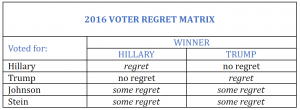Four years from now, will you regret having voted for the person you chose this year for president? In decision theory, there is a concept called “regret,” which is the emotion experienced when realizing that an alternative course of action would have likely resulted in a more favorable outcome.
The voter regret matrix included assumes that either Hillary Clinton or Donald Trump will win, and that Gary Johnson and Jill Stein will not. It also assumes that neither Hillary nor Donald will receive 50 percent of the vote, and a majority of Americans will have voted for other candidates. Implicitly, those who vote for either Mr. Johnson or Dr. Stein will realize that if most of the votes that had gone to the minority candidates had been cast for the loser between Mrs. Clinton and Mr. Trump, the other candidate would have won.
 Those who vote for Mrs. Clinton are probably doing so because she is a woman, or they like her bigger government policies with promises of free stuff, or because they fear Mr. Trump more. Most Clinton voters probably do not understand the importance of the rule of law both for a civil society and economic growth — and the importance of everyone being treated equally in the justice system. They also probably lack the historical knowledge of the various Clinton scandals, even including stealing furniture and other artifacts from the White House and the State Department.
Those who vote for Mrs. Clinton are probably doing so because she is a woman, or they like her bigger government policies with promises of free stuff, or because they fear Mr. Trump more. Most Clinton voters probably do not understand the importance of the rule of law both for a civil society and economic growth — and the importance of everyone being treated equally in the justice system. They also probably lack the historical knowledge of the various Clinton scandals, even including stealing furniture and other artifacts from the White House and the State Department.
Hillary’s supporters are probably going to be disappointed when they eventually realize that she is deeply flawed ethically, and her bad behavior and judgment are not going to improve once she becomes president. There will be a continuing series of investigations into both known and currently unknown legal transgressions, and further politicization of the Justice Department, FBI, Internal Revenue Service and other government agencies. At the same time, her big-spending plans are likely to be thwarted by Congress — which is all to the good for economic growth, but will disappoint her supporters. The rapid growth in regulation is likely to go unabated, further weakening an almost stagnant economy. The lack of economic growth will increase frictions among racial and ethnic groups and further widen regional disparities. Every president is confronted with foreign policy surprises, and Mrs. Clinton’s poor judgment in the past does not bode well for the future.
Most Trump voters are in favor of him because they like his policy prescriptions and his promises to clean up Washington, including appointing judges who actually believe in the Constitution, or because of an even greater fear of Mrs. Clinton. Those who vote for him are hoping that they will get a sober, responsible and thoughtful President Trump as exhibited in his Gettysburg speech this past Saturday, rather than a crass, egotistical, impulsive and insensitive Mr. Trump. They would probably get some of both because, like Hillary, Donald is unlikely to change at this age.
In his Gettysburg address, Mr. Trump explicitly acknowledged that much of what he would like to do is dependent on Congress (and its members are a large part of the swamp that he wants to clean up). For instance, there is almost no chance of him obtaining the goal of term limits for Congress, since the lawmakers would have to vote for it — and previous efforts for such a measure have gone nowhere. It is doubtful that he understands how difficult it will be to change the culture of Washington and the political class, which would cause many of his supporters to be disappointed at the lack of progress. When it comes to foreign policy, Mr. Trump is a blank slate, and much of his success or failure will depend upon his ability to get good advisers and then listen to them.
Realistic supporters of Gary Johnson and Jill Stein realize their candidates have no chance of winning, but can at least feel that they stood for principle, and will not have to own the disappointment or even disaster that could come from a Clinton or Trump win. If either Mr. Trump or Mrs. Clinton loses by a very narrow margin and the winner turns out to be terrible, then those who supported Mr. Johnson or Dr. Stein might feel some regret that if they (and their fellow Libertarian or Green party members) had voted for the least bad of the major candidates, the nation might be in better shape. Ironically, Mr. Johnson would probably be the least dangerous president, not because he knows more or would inspire, but because he would probably do less of the many bad things that the government now does. His foreign policy would probably be the opposite of reckless, and his willingness to acknowledge what he doesn’t know and rely on those who do is refreshing.
Those who would have the most regret with a Hillary win are the members of the press who have been making excuses and covering up for her, and now own her. When things go bad, they will deny their role in getting her elected, further diminishing their credibility and the demand for their news products — meaning job cuts. Much to the media’s regret, a President Trump would sell more newspapers.